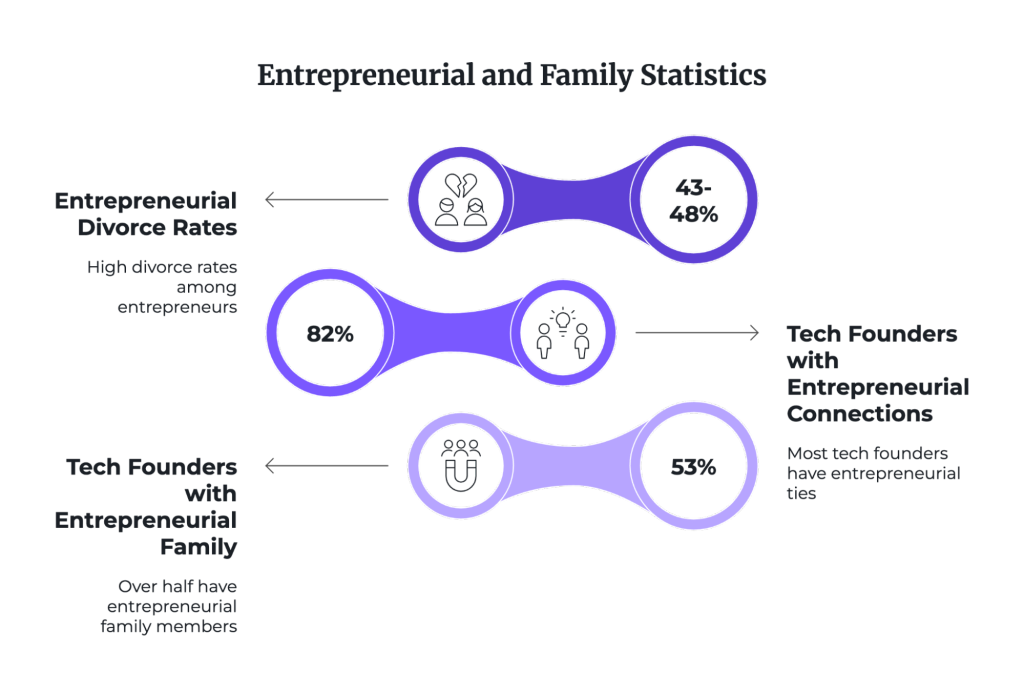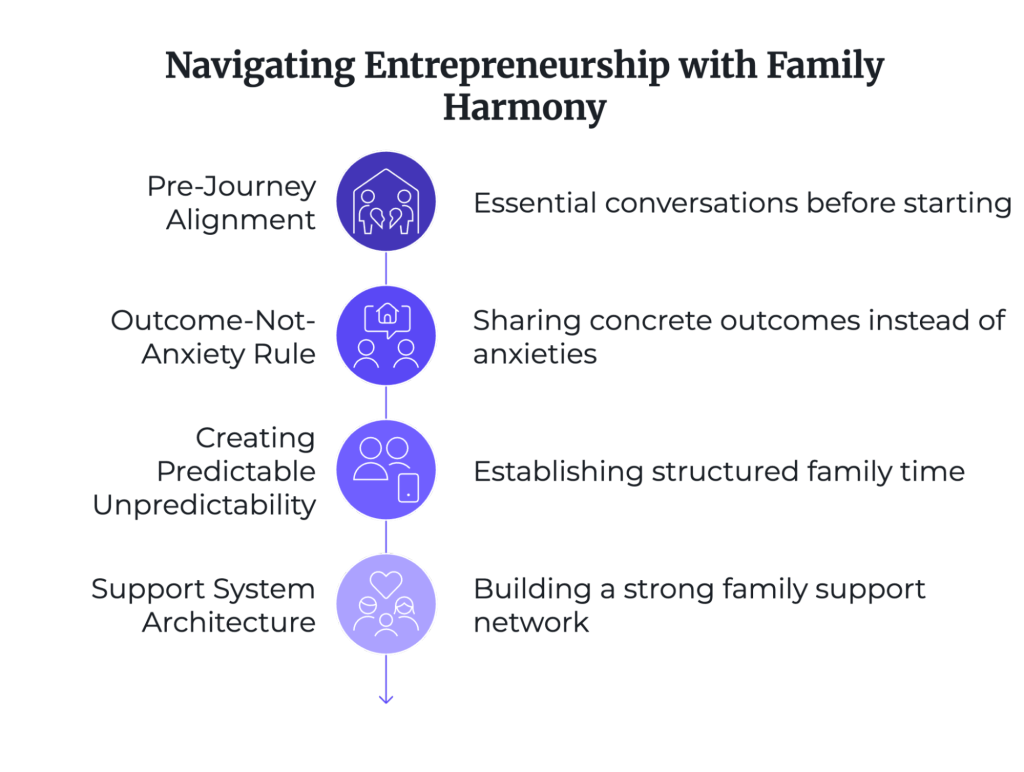The Night Everything Changed
Five days after our acquisition collapsed, I finally found the courage to tell my wife. We’d planned a celebration dinner for the sale that never happened. As I watched her face crumble from hope to shock, tears streaming down her cheeks, I realized the most painful truth of my entrepreneurial journey: I hadn’t just failed to close a deal—I’d failed to prepare the person I loved most for the roller coaster we were on together. That moment, a stark lesson in Family Dynamics in Startups, hit harder than any business setback. Here was my partner, who’d endured sleepless nights, mood swings, and financial uncertainty, learning about our company’s fate five days after the fact. I’d tried to protect her, but instead, I’d isolated her—and myself—in the process.
The Hidden Cost of Entrepreneurial Dreams
Every entrepreneur knows the statistics: most startups fail. But here’s what they don’t tell you: research shows that entrepreneurial divorce rates range between 43 and 48 percent, nearly matching the startup failure rate itself. Your family doesn’t just watch your entrepreneurial journey—they live it with you, feeling every high and weathering every storm.
I learned this the hard way. During my first two years as a founder, I became emotionally unpredictable. My son once told me, “Asking you for something and watching your reaction is like rolling dice.” Small things would trigger disproportionate responses. My wife endured the same sleepless nights, the same stress-induced mood swings, the same uncertainty—but without the context or control I had.
The truth is 82% of tech founders have at least one entrepreneur among their close connections, with 53% having a family member who’s also an entrepreneur. But even with this familiarity, most families are unprepared for the unique demands of startup life. Unlike traditional employment with predictable hours and steady paychecks, a startup requires constant attention—it’s like caring for a child who will die if not constantly fed at all hours.

Understanding the Entrepreneurial Impact on Your Family
When I started my company, I thought mental conditioning was just about preparing myself. I was wrong. Your family needs the same preparation, the same tools, the same understanding of what lies ahead. They’re not just passive observers—they’re active participants in your journey, whether you acknowledge it or not.
The entrepreneurial mindset I was building—growth-oriented, resilient, challenge-seeking—was foreign to my family. While I was learning to see setbacks as opportunities, they saw each challenge as a threat to our stability. While I celebrated small wins, they worried about the big picture. This disconnect created a chasm that grew wider with each passing month.
What I discovered through painful experience, and what research confirms, is that family dynamics significantly shape entrepreneurial ambitions and decision-making. Your family can be your greatest source of strength—or the weight that pulls you under.
Breaking My Silence: A Founder’s Confession
Two years into my startup journey, after nearly shutting down three times, I had an epiphany. I’d spent countless hours recruiting talent, pitching investors, and selling to customers, but I’d never truly “pitched” the most important person in my life—my wife. I’d never prepared her for what we were really signing up for.
One night, exhausted from another crisis, I sat down with my family and did something I should have done from day one: I opened up completely. I explained the thoughts-emotions loop that had been hijacking my reactions. I shared why seemingly small setbacks had paralyzed me for weeks. I admitted that my identity had become so intertwined with the startup that every challenge felt like a personal failure.
The conversation was messy, emotional, and long overdue. But it marked a turning point. My wife later told me, “I finally understood why you’d been so different. I wasn’t fighting you anymore—I was fighting alongside you.”
The Framework That Saved My Marriage (And My Startup)
Through trial and error, and eventual success, I developed a communication framework that transformed how my family and I navigated the entrepreneurial journey together. Here’s the systematic approach that made the difference:
1. The Pre-Journey Alignment
Before taking another step, have these essential conversations:
Financial Reality Check:
- What are we risking, and what are we protecting?
- What’s our “cut bait” number—the point where we walk away?
- How will we handle the feast-or-famine income cycles?
Lifestyle Expectations:
- How will our daily life change?
- What responsibilities might shift between partners?
- How do we handle the unpredictable schedule?
Role Clarity:
- Will family members be involved in the business?
- What are the boundaries between family time and work time?
- How do we prevent resentment from building?
2. The Outcome-Not-Anxiety Rule
I learned to stop dragging my family through every emotional peak and valley. As Justin Nassiri points out, early-stage entrepreneurs often share every fear and possibility—great sales leads that never convert, worries about clients who never actually leave. This creates unnecessary stress for family members.
Instead, I started sharing:
- Concrete outcomes rather than daily anxieties
- Weekly progress updates instead of hourly mood swings
- Celebrations of actual wins, not potential maybes
3. Creating Predictable Unpredictability
One of our breakthrough strategies was establishing “Work-Late Wednesdays”—scheduled times when I’d be unavailable. This predictability within the chaos gave my family a structure they could plan around. We also implemented:
- Sacred family dinners (phones off, no exceptions)
- Saturday morning family time (non-negotiable)
- Monthly “state of the startup” family meetings
4. The Support System Architecture
Research shows that family support networks serve as more than safety nets—they’re trampolines that propel entrepreneurs forward. We built our support system intentionally:
- Extended family understood their roles (and boundaries)
- Kids became age-appropriate participants, not victims
- My wife transformed from a worried observer to a strategic partner

Implementation: Your 30-Day Family Alignment Plan
Here’s how to start transforming your family dynamics within the next month:
Week 1: Assessment and Awareness
- Document how startup stress currently affects your family
- Track your mood patterns and their impact on family interactions
- Have individual conversations with each family member about their experience
Week 2: The Big Conversation
- Schedule a family meeting (make it special, not scary)
- Share your entrepreneurial “why” in terms they understand
- Listen—listen—to their fears and hopes
- Create a family mission statement together
Week 3: Structure Implementation
- Establish your version of “predictable unpredictability.”
- Set communication rhythms (daily check-ins, weekly updates)
- Create sacred family time blocks
- Develop your “outcome-not-anxiety” communication filter
Week 4: Reinforcement and Adjustment
- Celebrate the small wins together.
- Adjust structures based on what’s working
- Begin involving family appropriately in startup victories
- Start building extended support networks
The Transformation You Can Expect
When you properly prepare and involve your family in your entrepreneurial journey, the changes are profound:
For Your Relationships: You’ll move from isolation to partnership. Instead of shielding your family from your struggles, you’ll face challenges together. The shared purpose creates deeper bonds—my wife and I are closer now than before I started my company.
For Your Performance: With family stress reduced, your mental bandwidth expands dramatically. Studies show that entrepreneurs with strong family support networks experience reduced stress and enhanced mental health, leading to better business decisions.
For Your Resilience: When your family understands the journey, they become sources of strength during tough times. My lowest moments became opportunities for family connection rather than isolation.
For Your Legacy: My children now understand entrepreneurship isn’t just about making money—it’s about solving problems, serving others, and persevering through challenges. They’ve learned lessons no classroom could teach.
Your Next Step: From Isolation to Integration
The entrepreneurial journey doesn’t have to destroy your family—it can strengthen it. But this requires intentional preparation, honest communication, and systematic support structures.
Start today with one simple action: Have an honest conversation with your family about what you’ve been experiencing. Share this article with them. Open the door to dialogue.
Ready to build deeper family resilience for your entrepreneurial journey? Download our Family Communication Framework for Entrepreneurs—a comprehensive guide with conversation templates, meeting structures, and alignment exercises designed specifically for startup families.
Or dive deeper into building complete mental and emotional resilience with The Inside-Out Entrepreneur. Chapter 8 provides the full blueprint for creating a support system that sustains both your business and your relationships.











Responses